Environmental Sustainability Report and Analysis - Business Ethics
VerifiedAdded on 2022/08/12
|7
|1347
|21
Report
AI Summary
This report examines environmental sustainability and its importance, highlighting the need for businesses to integrate sustainability into their operations. It explores the concept of social fairness and the protection of the environment for both present and future generations. The report then delves into practical steps businesses can take to reduce their environmental footprint, including energy efficiency, renewable energy adoption, and waste reduction. The report also analyzes global business ethics, particularly focusing on operating in China and the cultural differences that impact business practices. It discusses the importance of establishing ethical guidelines, codes of conduct, and government regulations to ensure ethical behavior in global business operations. The report references the Foreign Corrupt Practices Act and provides an overview of ethical considerations for businesses.
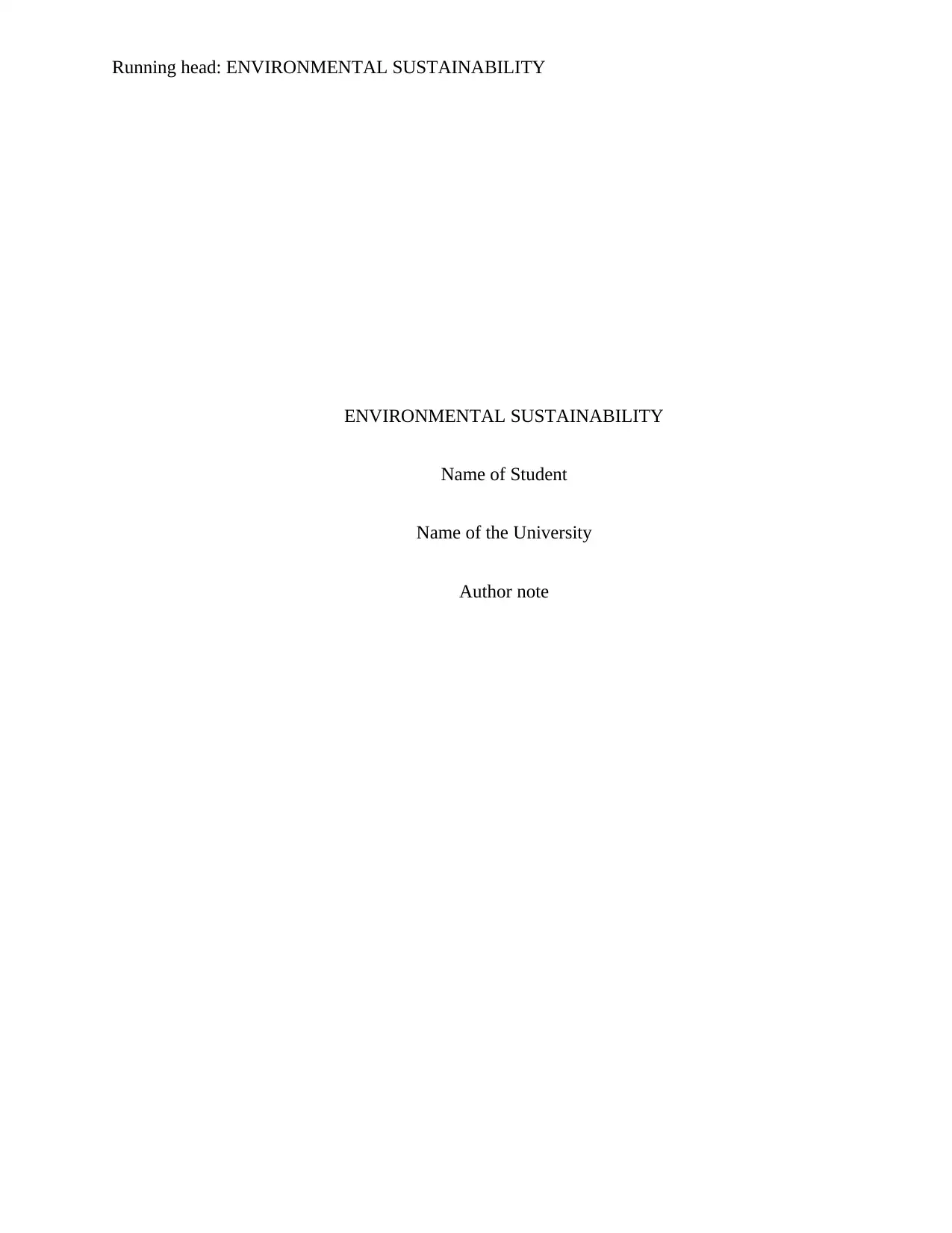
Running head: ENVIRONMENTAL SUSTAINABILITY
ENVIRONMENTAL SUSTAINABILITY
Name of Student
Name of the University
Author note
ENVIRONMENTAL SUSTAINABILITY
Name of Student
Name of the University
Author note
Paraphrase This Document
Need a fresh take? Get an instant paraphrase of this document with our AI Paraphraser
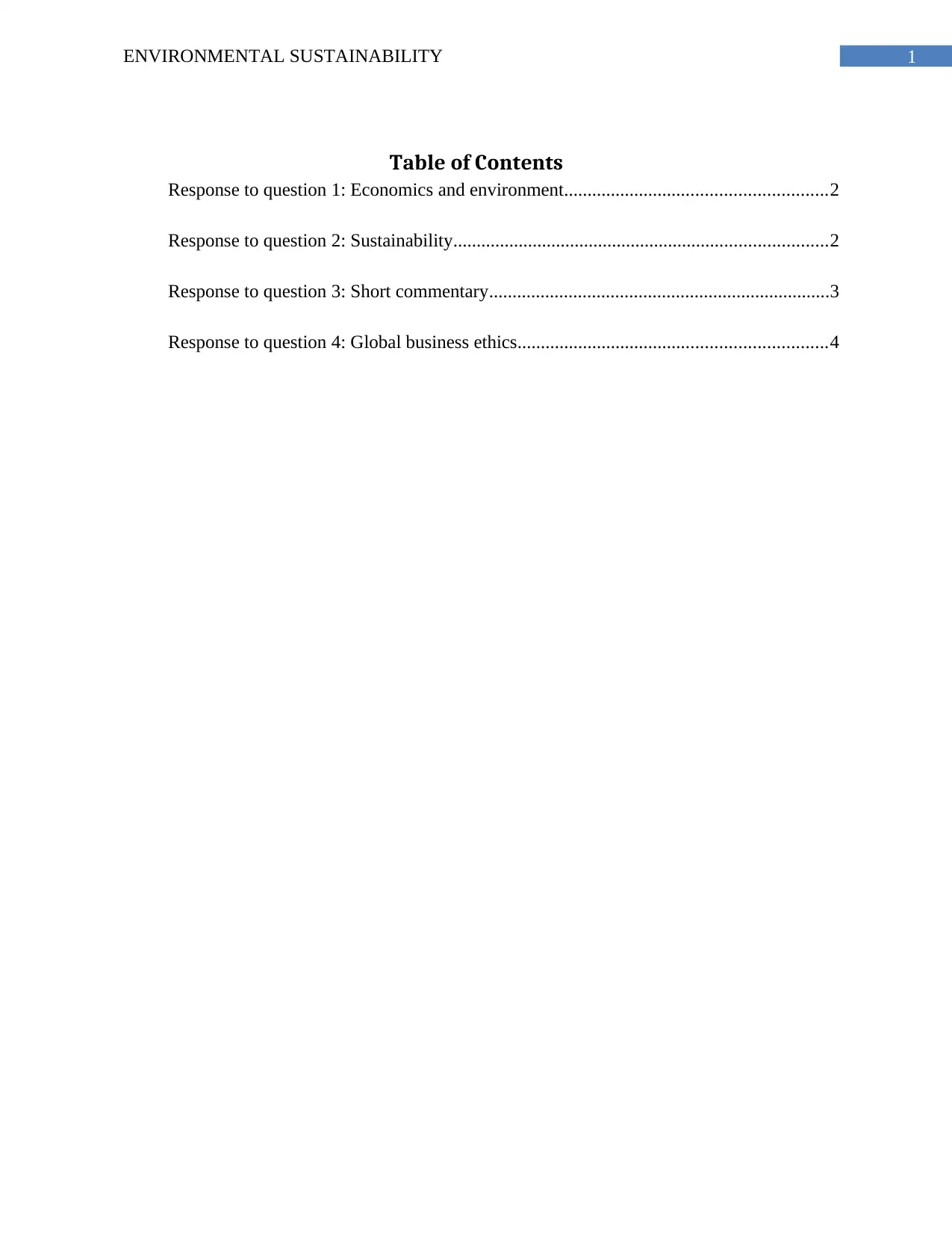
1ENVIRONMENTAL SUSTAINABILITY
Table of Contents
Response to question 1: Economics and environment........................................................2
Response to question 2: Sustainability................................................................................2
Response to question 3: Short commentary.........................................................................3
Response to question 4: Global business ethics..................................................................4
Table of Contents
Response to question 1: Economics and environment........................................................2
Response to question 2: Sustainability................................................................................2
Response to question 3: Short commentary.........................................................................3
Response to question 4: Global business ethics..................................................................4
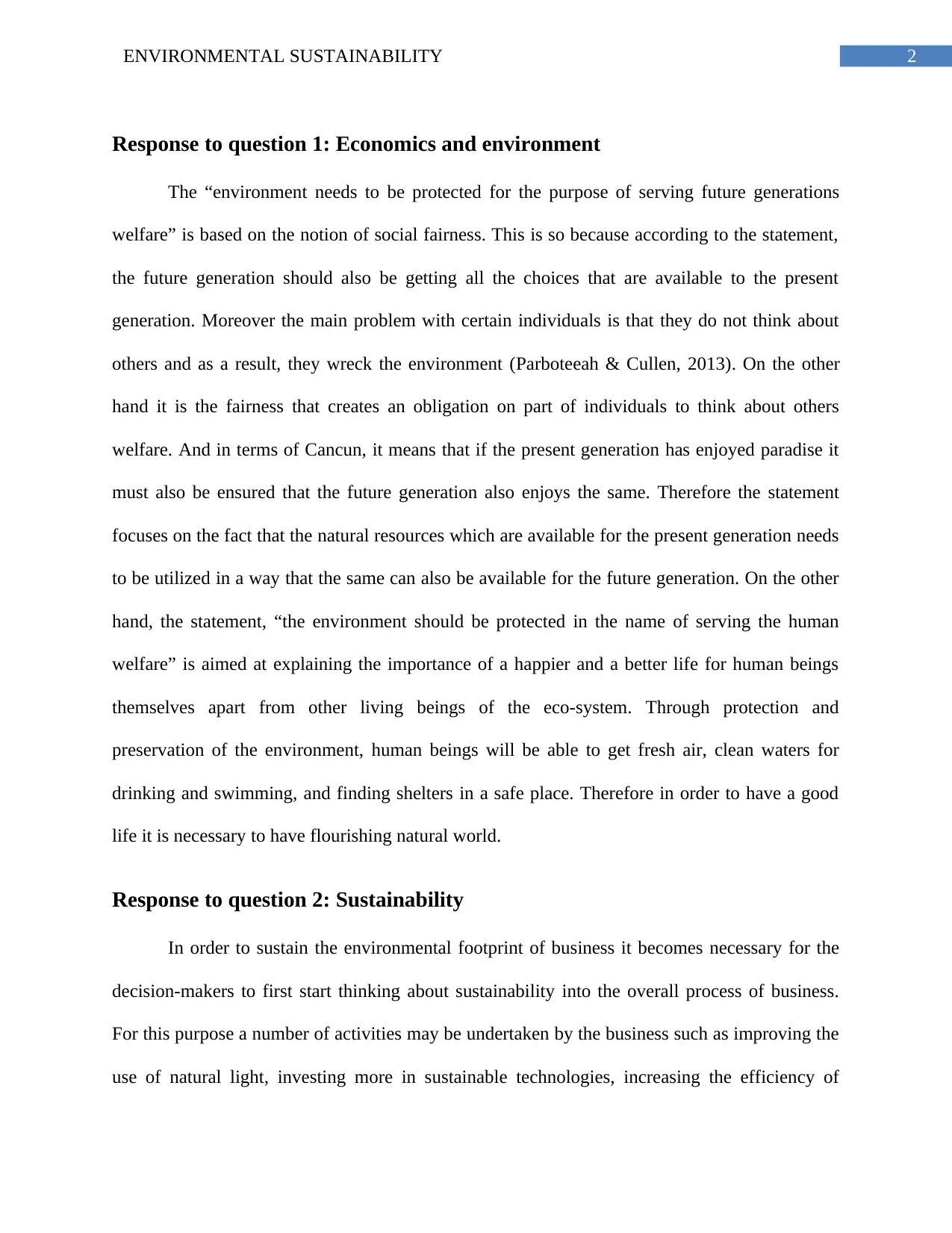
2ENVIRONMENTAL SUSTAINABILITY
Response to question 1: Economics and environment
The “environment needs to be protected for the purpose of serving future generations
welfare” is based on the notion of social fairness. This is so because according to the statement,
the future generation should also be getting all the choices that are available to the present
generation. Moreover the main problem with certain individuals is that they do not think about
others and as a result, they wreck the environment (Parboteeah & Cullen, 2013). On the other
hand it is the fairness that creates an obligation on part of individuals to think about others
welfare. And in terms of Cancun, it means that if the present generation has enjoyed paradise it
must also be ensured that the future generation also enjoys the same. Therefore the statement
focuses on the fact that the natural resources which are available for the present generation needs
to be utilized in a way that the same can also be available for the future generation. On the other
hand, the statement, “the environment should be protected in the name of serving the human
welfare” is aimed at explaining the importance of a happier and a better life for human beings
themselves apart from other living beings of the eco-system. Through protection and
preservation of the environment, human beings will be able to get fresh air, clean waters for
drinking and swimming, and finding shelters in a safe place. Therefore in order to have a good
life it is necessary to have flourishing natural world.
Response to question 2: Sustainability
In order to sustain the environmental footprint of business it becomes necessary for the
decision-makers to first start thinking about sustainability into the overall process of business.
For this purpose a number of activities may be undertaken by the business such as improving the
use of natural light, investing more in sustainable technologies, increasing the efficiency of
Response to question 1: Economics and environment
The “environment needs to be protected for the purpose of serving future generations
welfare” is based on the notion of social fairness. This is so because according to the statement,
the future generation should also be getting all the choices that are available to the present
generation. Moreover the main problem with certain individuals is that they do not think about
others and as a result, they wreck the environment (Parboteeah & Cullen, 2013). On the other
hand it is the fairness that creates an obligation on part of individuals to think about others
welfare. And in terms of Cancun, it means that if the present generation has enjoyed paradise it
must also be ensured that the future generation also enjoys the same. Therefore the statement
focuses on the fact that the natural resources which are available for the present generation needs
to be utilized in a way that the same can also be available for the future generation. On the other
hand, the statement, “the environment should be protected in the name of serving the human
welfare” is aimed at explaining the importance of a happier and a better life for human beings
themselves apart from other living beings of the eco-system. Through protection and
preservation of the environment, human beings will be able to get fresh air, clean waters for
drinking and swimming, and finding shelters in a safe place. Therefore in order to have a good
life it is necessary to have flourishing natural world.
Response to question 2: Sustainability
In order to sustain the environmental footprint of business it becomes necessary for the
decision-makers to first start thinking about sustainability into the overall process of business.
For this purpose a number of activities may be undertaken by the business such as improving the
use of natural light, investing more in sustainable technologies, increasing the efficiency of
⊘ This is a preview!⊘
Do you want full access?
Subscribe today to unlock all pages.

Trusted by 1+ million students worldwide
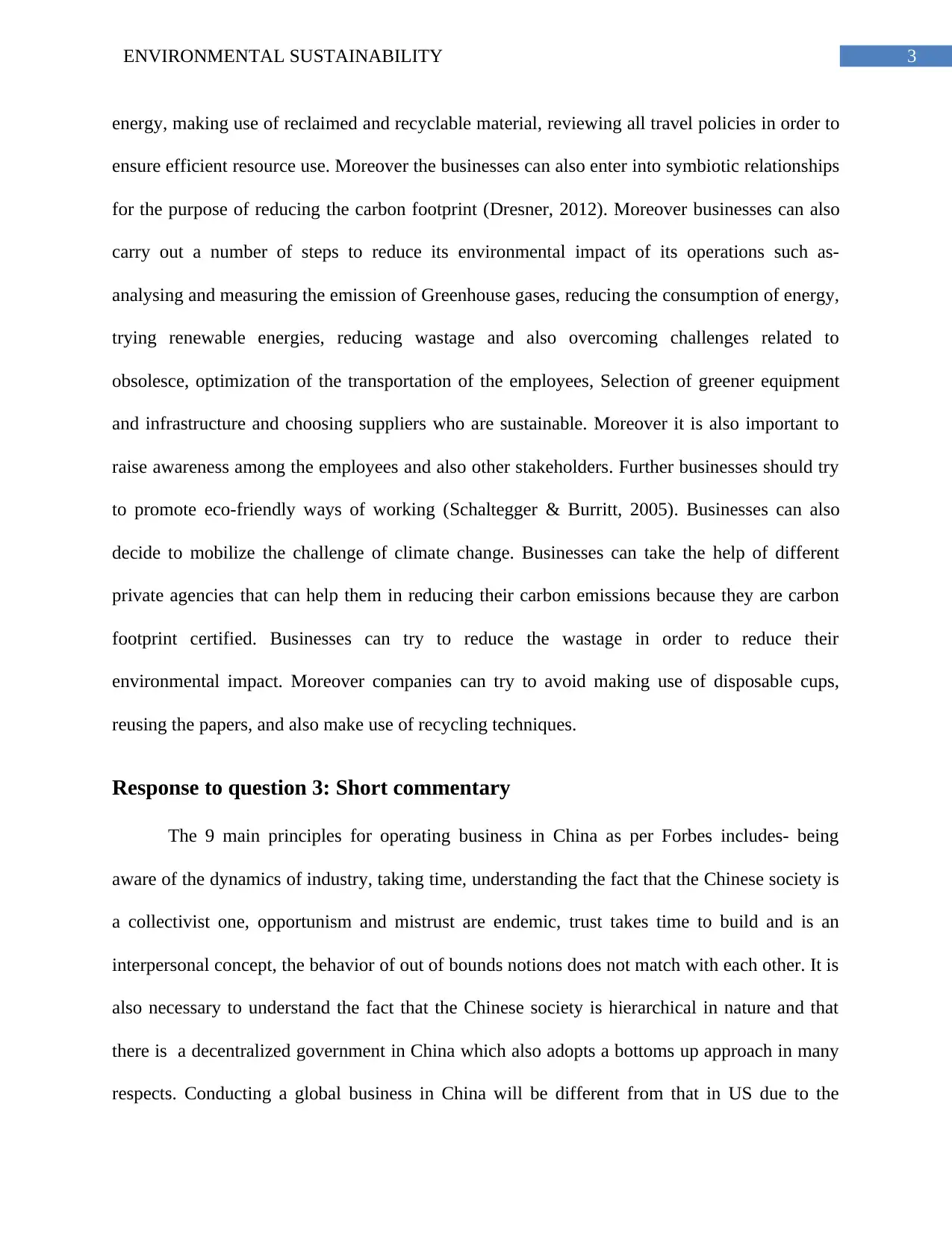
3ENVIRONMENTAL SUSTAINABILITY
energy, making use of reclaimed and recyclable material, reviewing all travel policies in order to
ensure efficient resource use. Moreover the businesses can also enter into symbiotic relationships
for the purpose of reducing the carbon footprint (Dresner, 2012). Moreover businesses can also
carry out a number of steps to reduce its environmental impact of its operations such as-
analysing and measuring the emission of Greenhouse gases, reducing the consumption of energy,
trying renewable energies, reducing wastage and also overcoming challenges related to
obsolesce, optimization of the transportation of the employees, Selection of greener equipment
and infrastructure and choosing suppliers who are sustainable. Moreover it is also important to
raise awareness among the employees and also other stakeholders. Further businesses should try
to promote eco-friendly ways of working (Schaltegger & Burritt, 2005). Businesses can also
decide to mobilize the challenge of climate change. Businesses can take the help of different
private agencies that can help them in reducing their carbon emissions because they are carbon
footprint certified. Businesses can try to reduce the wastage in order to reduce their
environmental impact. Moreover companies can try to avoid making use of disposable cups,
reusing the papers, and also make use of recycling techniques.
Response to question 3: Short commentary
The 9 main principles for operating business in China as per Forbes includes- being
aware of the dynamics of industry, taking time, understanding the fact that the Chinese society is
a collectivist one, opportunism and mistrust are endemic, trust takes time to build and is an
interpersonal concept, the behavior of out of bounds notions does not match with each other. It is
also necessary to understand the fact that the Chinese society is hierarchical in nature and that
there is a decentralized government in China which also adopts a bottoms up approach in many
respects. Conducting a global business in China will be different from that in US due to the
energy, making use of reclaimed and recyclable material, reviewing all travel policies in order to
ensure efficient resource use. Moreover the businesses can also enter into symbiotic relationships
for the purpose of reducing the carbon footprint (Dresner, 2012). Moreover businesses can also
carry out a number of steps to reduce its environmental impact of its operations such as-
analysing and measuring the emission of Greenhouse gases, reducing the consumption of energy,
trying renewable energies, reducing wastage and also overcoming challenges related to
obsolesce, optimization of the transportation of the employees, Selection of greener equipment
and infrastructure and choosing suppliers who are sustainable. Moreover it is also important to
raise awareness among the employees and also other stakeholders. Further businesses should try
to promote eco-friendly ways of working (Schaltegger & Burritt, 2005). Businesses can also
decide to mobilize the challenge of climate change. Businesses can take the help of different
private agencies that can help them in reducing their carbon emissions because they are carbon
footprint certified. Businesses can try to reduce the wastage in order to reduce their
environmental impact. Moreover companies can try to avoid making use of disposable cups,
reusing the papers, and also make use of recycling techniques.
Response to question 3: Short commentary
The 9 main principles for operating business in China as per Forbes includes- being
aware of the dynamics of industry, taking time, understanding the fact that the Chinese society is
a collectivist one, opportunism and mistrust are endemic, trust takes time to build and is an
interpersonal concept, the behavior of out of bounds notions does not match with each other. It is
also necessary to understand the fact that the Chinese society is hierarchical in nature and that
there is a decentralized government in China which also adopts a bottoms up approach in many
respects. Conducting a global business in China will be different from that in US due to the
Paraphrase This Document
Need a fresh take? Get an instant paraphrase of this document with our AI Paraphraser
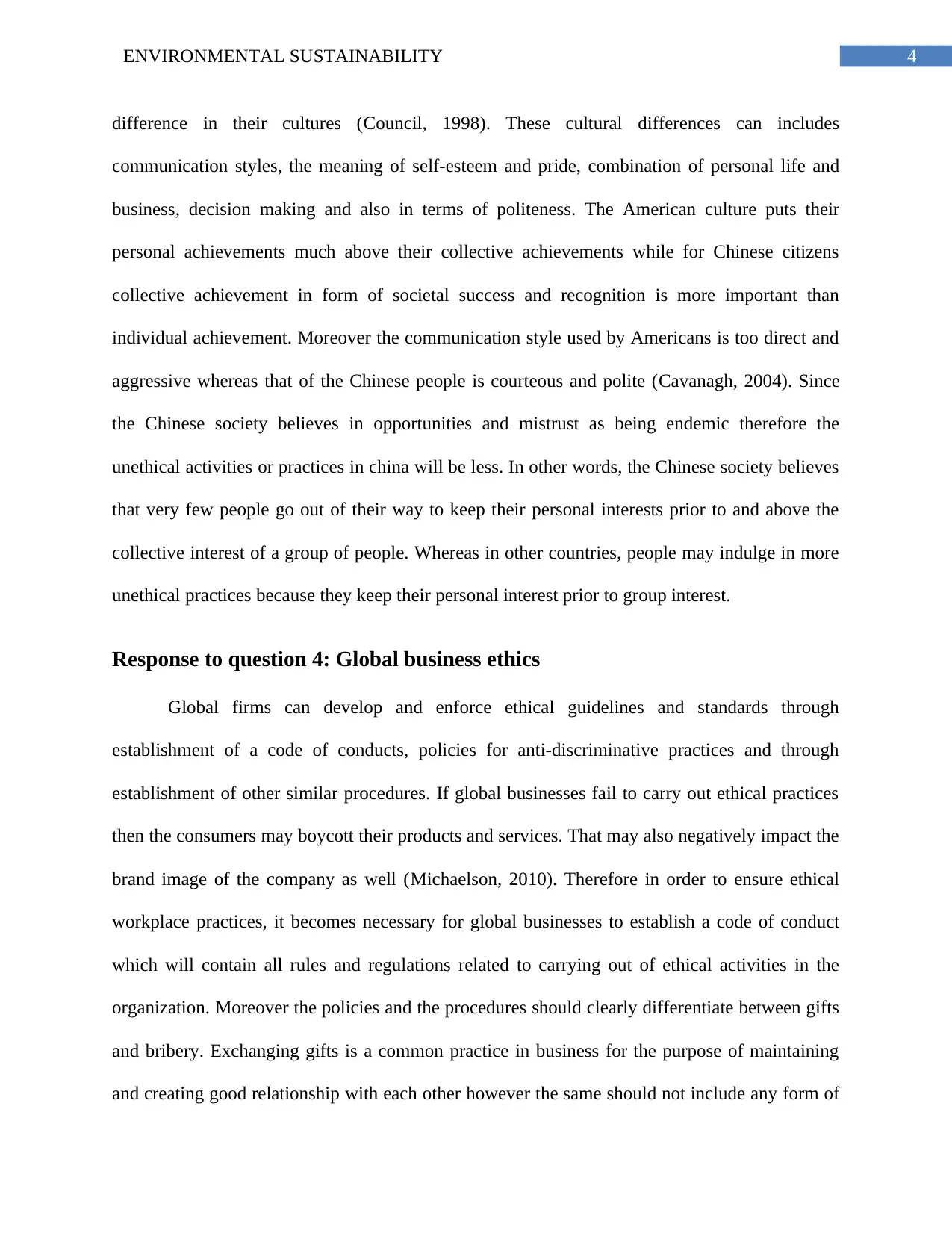
4ENVIRONMENTAL SUSTAINABILITY
difference in their cultures (Council, 1998). These cultural differences can includes
communication styles, the meaning of self-esteem and pride, combination of personal life and
business, decision making and also in terms of politeness. The American culture puts their
personal achievements much above their collective achievements while for Chinese citizens
collective achievement in form of societal success and recognition is more important than
individual achievement. Moreover the communication style used by Americans is too direct and
aggressive whereas that of the Chinese people is courteous and polite (Cavanagh, 2004). Since
the Chinese society believes in opportunities and mistrust as being endemic therefore the
unethical activities or practices in china will be less. In other words, the Chinese society believes
that very few people go out of their way to keep their personal interests prior to and above the
collective interest of a group of people. Whereas in other countries, people may indulge in more
unethical practices because they keep their personal interest prior to group interest.
Response to question 4: Global business ethics
Global firms can develop and enforce ethical guidelines and standards through
establishment of a code of conducts, policies for anti-discriminative practices and through
establishment of other similar procedures. If global businesses fail to carry out ethical practices
then the consumers may boycott their products and services. That may also negatively impact the
brand image of the company as well (Michaelson, 2010). Therefore in order to ensure ethical
workplace practices, it becomes necessary for global businesses to establish a code of conduct
which will contain all rules and regulations related to carrying out of ethical activities in the
organization. Moreover the policies and the procedures should clearly differentiate between gifts
and bribery. Exchanging gifts is a common practice in business for the purpose of maintaining
and creating good relationship with each other however the same should not include any form of
difference in their cultures (Council, 1998). These cultural differences can includes
communication styles, the meaning of self-esteem and pride, combination of personal life and
business, decision making and also in terms of politeness. The American culture puts their
personal achievements much above their collective achievements while for Chinese citizens
collective achievement in form of societal success and recognition is more important than
individual achievement. Moreover the communication style used by Americans is too direct and
aggressive whereas that of the Chinese people is courteous and polite (Cavanagh, 2004). Since
the Chinese society believes in opportunities and mistrust as being endemic therefore the
unethical activities or practices in china will be less. In other words, the Chinese society believes
that very few people go out of their way to keep their personal interests prior to and above the
collective interest of a group of people. Whereas in other countries, people may indulge in more
unethical practices because they keep their personal interest prior to group interest.
Response to question 4: Global business ethics
Global firms can develop and enforce ethical guidelines and standards through
establishment of a code of conducts, policies for anti-discriminative practices and through
establishment of other similar procedures. If global businesses fail to carry out ethical practices
then the consumers may boycott their products and services. That may also negatively impact the
brand image of the company as well (Michaelson, 2010). Therefore in order to ensure ethical
workplace practices, it becomes necessary for global businesses to establish a code of conduct
which will contain all rules and regulations related to carrying out of ethical activities in the
organization. Moreover the policies and the procedures should clearly differentiate between gifts
and bribery. Exchanging gifts is a common practice in business for the purpose of maintaining
and creating good relationship with each other however the same should not include any form of
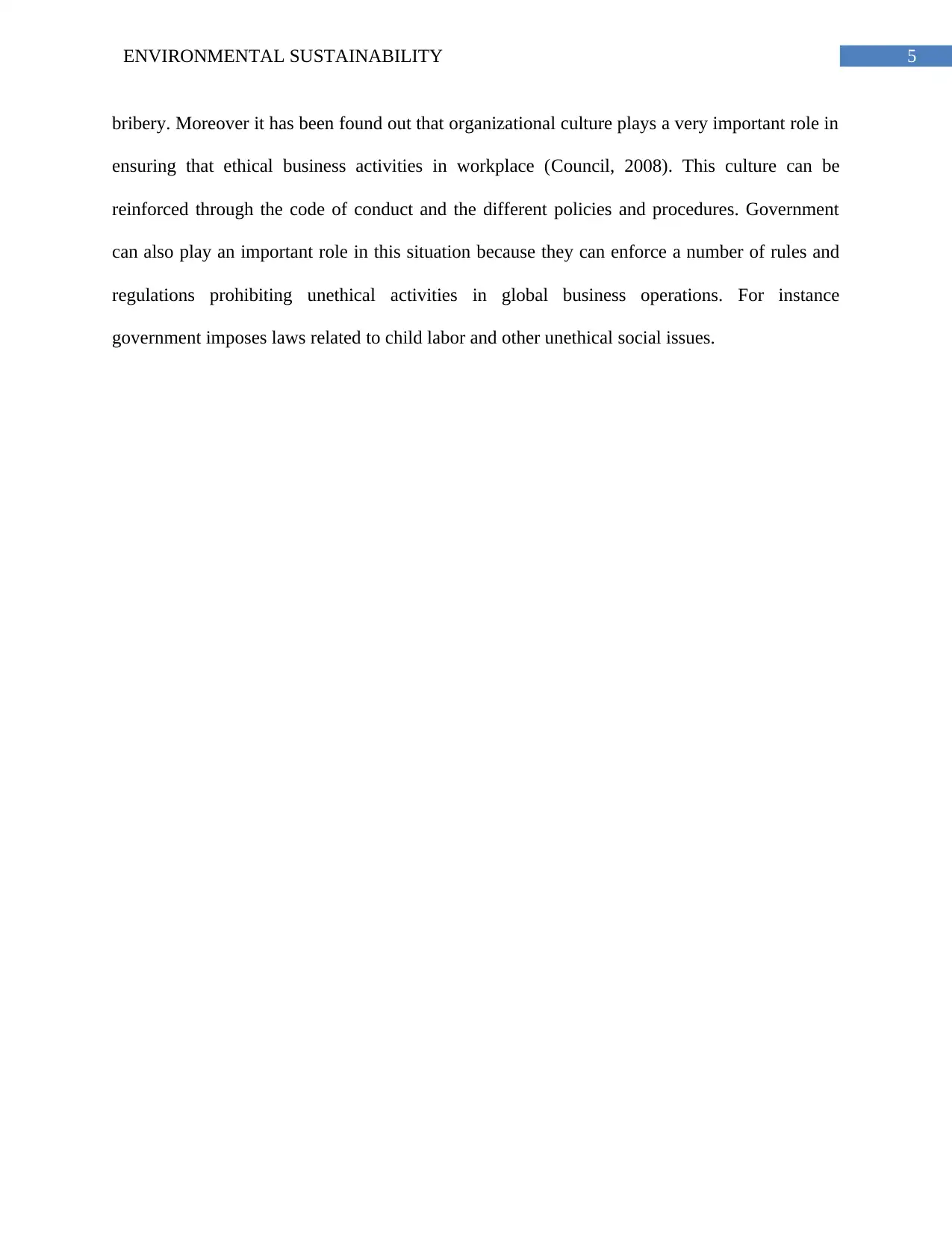
5ENVIRONMENTAL SUSTAINABILITY
bribery. Moreover it has been found out that organizational culture plays a very important role in
ensuring that ethical business activities in workplace (Council, 2008). This culture can be
reinforced through the code of conduct and the different policies and procedures. Government
can also play an important role in this situation because they can enforce a number of rules and
regulations prohibiting unethical activities in global business operations. For instance
government imposes laws related to child labor and other unethical social issues.
bribery. Moreover it has been found out that organizational culture plays a very important role in
ensuring that ethical business activities in workplace (Council, 2008). This culture can be
reinforced through the code of conduct and the different policies and procedures. Government
can also play an important role in this situation because they can enforce a number of rules and
regulations prohibiting unethical activities in global business operations. For instance
government imposes laws related to child labor and other unethical social issues.
⊘ This is a preview!⊘
Do you want full access?
Subscribe today to unlock all pages.

Trusted by 1+ million students worldwide
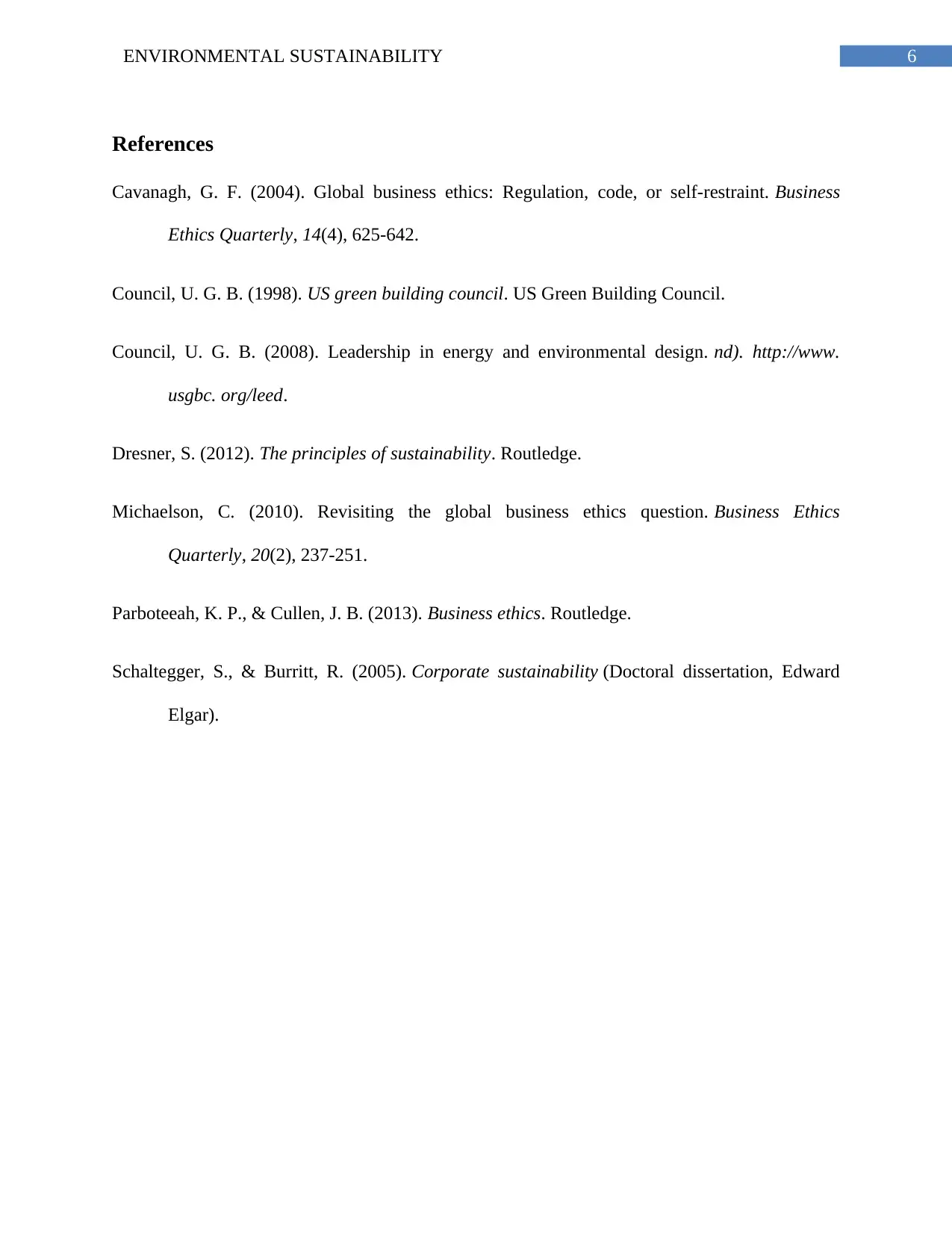
6ENVIRONMENTAL SUSTAINABILITY
References
Cavanagh, G. F. (2004). Global business ethics: Regulation, code, or self-restraint. Business
Ethics Quarterly, 14(4), 625-642.
Council, U. G. B. (1998). US green building council. US Green Building Council.
Council, U. G. B. (2008). Leadership in energy and environmental design. nd). http://www.
usgbc. org/leed.
Dresner, S. (2012). The principles of sustainability. Routledge.
Michaelson, C. (2010). Revisiting the global business ethics question. Business Ethics
Quarterly, 20(2), 237-251.
Parboteeah, K. P., & Cullen, J. B. (2013). Business ethics. Routledge.
Schaltegger, S., & Burritt, R. (2005). Corporate sustainability (Doctoral dissertation, Edward
Elgar).
References
Cavanagh, G. F. (2004). Global business ethics: Regulation, code, or self-restraint. Business
Ethics Quarterly, 14(4), 625-642.
Council, U. G. B. (1998). US green building council. US Green Building Council.
Council, U. G. B. (2008). Leadership in energy and environmental design. nd). http://www.
usgbc. org/leed.
Dresner, S. (2012). The principles of sustainability. Routledge.
Michaelson, C. (2010). Revisiting the global business ethics question. Business Ethics
Quarterly, 20(2), 237-251.
Parboteeah, K. P., & Cullen, J. B. (2013). Business ethics. Routledge.
Schaltegger, S., & Burritt, R. (2005). Corporate sustainability (Doctoral dissertation, Edward
Elgar).
1 out of 7
Related Documents
Your All-in-One AI-Powered Toolkit for Academic Success.
+13062052269
info@desklib.com
Available 24*7 on WhatsApp / Email
![[object Object]](/_next/static/media/star-bottom.7253800d.svg)
Unlock your academic potential
Copyright © 2020–2026 A2Z Services. All Rights Reserved. Developed and managed by ZUCOL.



